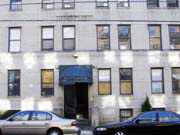The southeast corner building on Grant and Bergen avenues was boarded up two weeks ago after Jersey City housing inspectors deemed it uninhabitable in February.
The Fairmount Housing Corporation (FHC), which owns the building on 149 Grant Ave., said the building would have been closed sooner if one family didn’t refuse to leave.
On March 1, Betty McRae and her two children were evicted from their second floor apartment in the building. Her eviction made her angry toward FHC executives, city officials, and politicians.
“They sanctioned me because I did not go into work,” McRae said.
According to FHC Executive Director Harold Colton-Max, Fairmount notified residents of the building’s closure approximately a year ago, and helped to relocate several families to other low-income housing units.
There are several reasons that FHC did not help McRae, claimed Colton-Max. Two years ago, her oldest daughter allegedly harassed and assaulted another tenant. The tenant pressed charges, and a warrant for her arrest has been issued. The case will be tried in court this year, police said.
McRae would not comment on what she referred to as “personal details,” but she said that her reason for not being able to work was due to several respiratory health problems that have led to hospitalizations in recent months.
“I can’t work. My health is too bad,” she said.
McRae, who said she receives $120 of social services aid a month from the state, is now engaged in looking for any form of housing for herself and her family, she said.
A self-described community activist and lifelong Jersey City resident, McRae said she would no longer vote in elections and hopes that her newfound homelessness brings light to the poverty in the city.
“That’s the mayor’s job, to stop drugs, crime, and homelessness,” McRae said.
Colton-Max suggested that McRae “look into other housing options in the city.”
“We have done a very good job of helping people with housing,” Colton-Max said. “[McRae] could have made preparations.”
However, Fairmount also evicted two other families from the housing for non-payment of rent. Colton-Max would not comment further on those situations. Two other families were relocated to different low-income housing.
McRae said she would live with friends until she can find a permanent home with her family.
A non-profit corporation, FHC is funded through state and federal grants. It also incorporates development fees into its yearly-operating budget, which can range anywhere from $100,000 to $200,000.
Building needs repairs The Grant Avenue building had to be evacuated because it was “in need of serious repairs,” said Colton-Max. Debris, garbage, broken windows, fecal matter on the floors, and leaky roofs made it a convenient haven for the homeless, junkies, and criminals in the area to seek refuge, he said, and an uninhabitable complex for residents.
Colton-Max said that since its inception in 1991, 149 Grant Ave. experienced moderate operating problems, among them a faulty roofing system. Through the years, those problems escalated, resulting in its eventual demise.
“This is the extreme conclusion, closing down the building,” he said. “We don’t like to close buildings, we want to run and operate successful housing units.”
FHC can either repair the property on 149 Grant Ave., or sell it. So far, Colton-Max said FHC has submitted redevelopment proposals to the city, county and the state to repair and reopen the building and provide low-income housing.
“I’m hopeful we’ll provide affordable housing there,” he said.
FHC provides housing for low and moderate-income families in Hudson County. The current FHC waiting list has more than 50 names from interested families. Their web site is www.fairmount-housing.org and their telephone number is (201) 333-9305.
For over a decade, FHC has developed and operated 107 units of permanent affordable rental housing for families at nine locations throughout Jersey City and Bayonne, while restoring vacant abandoned properties to assets for the community, according to Colton-Max.
